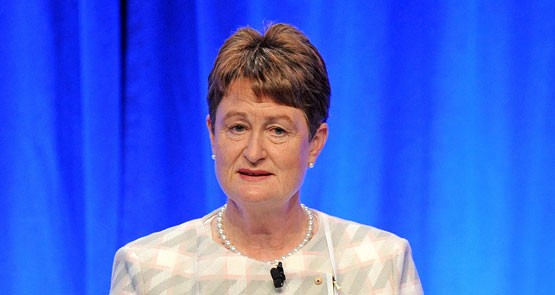
CBA chair Catherine Livingstone
The body count from Commonwealth Bank chair Catherine Livingstone’s follow-up to the money-laundering scandal has now reached four, with the CBA announcing this morning that long-time directors Launa Inman (2011), Andrew Mohl (2008) and Harrison Young (2007) were departing — though Mohl will be sticking around for a year. They join CEO, Ian Narev who is slated to leave next June but who will be gone as soon as the bank finishes its search for a new CEO.
Livingstone has tried to background that the board changes are unconnected to the money-laundering scandal, but Inman, Young and Mohl were all members of the bank’s Audit, Remuneration and Risk Committees. Long-time Westpac exec and former New South Wales Treasury head Robin Whitfield will join the board immediately, giving it some strong banking experience.
But no amount of boardroom musical chairs is going to stop the scandal from continuing to savage the bank as foreign regulators start sniffing around.
It was a month yesterday that the Commonwealth Bank’s great secret was revealed by AUSTRAC. Since then, despite the announcement of a near-$10 billion profit, 10% or around $14.5 billion has been wiped from the value of the bank’s shares. Friday’s close of $75.48 was the lowest since last November. That has hurt not only the bank’s 800,000 Australian shareholders, but also every Australian with retirement super through funds large and small.
The scandal has already spotlighted the performance of the former chairman David Turner, who retired late last year and hoped to slip into anonymity. But there are also questions about the role of his replacement Livingstone, who joined the board in 2016, after the board — by its own admission — knew about the AUSTRAC claims. Livingstone attended two of three board meetings in the year to June 2016 and all 11 meetings in 2016-17, and at no stage did we hear of the money-laundering issue until AUSTRACc revealed it on August 3.
But now the bank faces the additional problem of dealing with offshore regulators — especially those in the UK and the US (including New York state). Unlike Australia’s corporate regulators, who have had to be pushed kicking and screaming into actually taking action against the top end of town in response to egregious and repeated breaches of the law, overseas regulators have levied multibillion-dollar fines against some of the world’s biggest banks (such as HSBC and Standard Chartered) over money-laundering. They will have no compunction in doing the same to CBA. The Hong Kong Monetary Authority and China’s central bank and regulator will also be very interested, seeing much of the money was sent to Hong Kong.
Investment firm CLSA’s banking analyst Brian Johnson told clients late last week there was “clear evidence that CBA’s present AUSTRAC dispute goes well beyond the simple ‘coding error’ rhetoric from CBA … It’s likely cross border, possibly in domiciles where regulators seem to extract fines of an extraordinary level.” He highlighted a case last week where New York State’s Department of Financial Services said it would seek a fine of up to US$630 million of Pakistan’s biggest bank because of “grave” anti-money-laundering compliance failings.
Livingstone and friends may well discover that years of soft-touch “co-regulation” by local regulators are going to be paid for with an altogether more stringent approach from agencies that aren’t interested in keeping in the good books of the Australian business establishment.







When the CBA was wholly owned by the Australian people it was an honorable bank. What went wrong?
Time for another people’s bank.
Bored-room decisions? How much in PR/advertising is this “series of unfortunate (self-inflicted) events” going to cost share-holders, and customers, to try to lip-gloss over?
Royal Commission into all banks anyone???
I don’t even want to renationalise this toxic tumour.
Let’s start from scratch, a bank for the common weal, no whistles & bells, bond interest rates and a commitment to owner occupiers.
How hard could it be?
Anyone listening? Certainly not bumBoilShlernt.
The sale of the Commonwealth Bank was a brainchild of the Hawke Keating Government. This may come to haunt their legacy. Time to wind back the clocks?